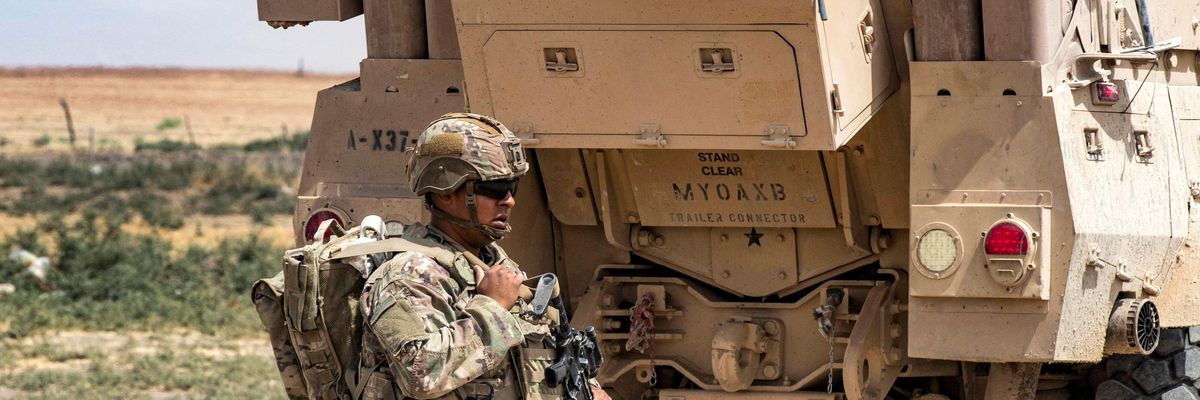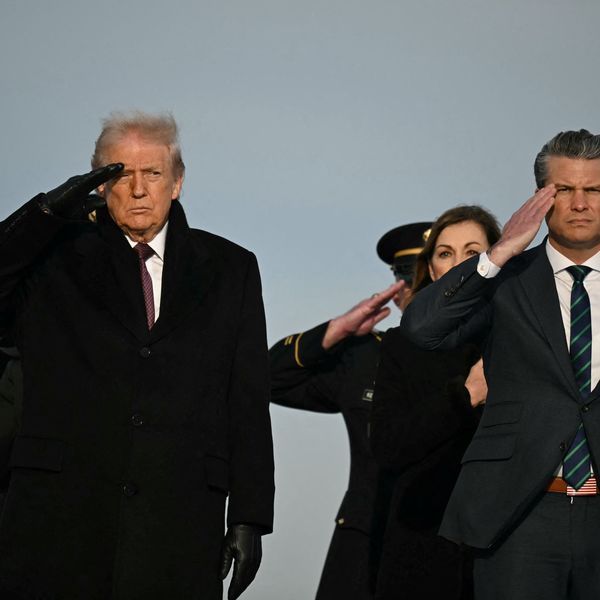
A U.S. soldier stands near the Syrian-Turkish border on August 21, 2022. (Photo: Delil SouleiMman/AFP via Getty Images)
Dangerous 'Cycle of Escalation' Intensifies After Unauthorized US Bombings in Syria
Iran called the U.S. airstrikes "a terrorist act" as the two countries work to finalize a revived nuclear agreement.
Without legal authorization from Congress, the U.S. military launched a series of bombing campaigns this week against what American officials characterized as Iranian proxies in Syria, intensifying tit-for-tat violence that observers fear could spill into a broader and deadlier conflict.
The U.S. described the strikes, carried out by Central Command (CENTCOM) forces in eastern and northeastern Syria, as retaliation for August 15 rocket attacks on a base housing American military personnel. CENTCOM blamed "Iran-backed groups" for the attacks.
"The continued presence of American troops in parts of Syria is against international laws."
In a statement Thursday after "Iran-affiliated militants" purportedly launched another series of rocket attacks the previous day, CENTCOM said U.S. airstrikes over the past 24 hours have killed "four enemy fighters" and destroyed "seven enemy rocket launchers." It's not clear whether any civilians were killed or harmed.
The Syrian groups' rocket attacks Wednesday reportedly injured three U.S. servicemembers, and additional attacks were reported Thursday.
"The CENTCOM strikes in Syria are now part of a cycle of escalation that is endangering U.S. troops," Erik Sperling, executive director of Just Foreign Policy, warned late Wednesday. "Congress never authorized U.S. military action, as required by U.S. law and the Constitution."
"In fact, last month, 60% of House Democrats voted to end the U.S. military role in Syria," Sperling noted, pointing to a failed amendment led by Rep. Jamaal Bowman (D-N.Y.).
"Stunning that POTUS and CENTCOM try to say that strikes on 'Iranian-backed militias'--sworn enemies of ISIS--is part of the anti-ISIS mission," Sperling added. "Also stunning that they say the anti-ISIS mission is authorized by Congress's vote 7,649 days ago (2001 AUMF)."
In a statement Tuesday after the first round of U.S. airstrikes in Syria this week, CENTCOM claimed its bombings were legal because "the president gave the direction... pursuant to his Article II authority to protect and defend U.S. personnel by disrupting or deterring attacks by Iran-backed groups."
But progressive foreign policy advocates questioned that legal basis, particularly given the rocket attacks followed just a day later.
"The admin's use of an Article II 'deterrence' justification for their 8/23 Syria airstrikes has now been completely discredited," Demand Progress tweeted late Wednesday. "U.S. soldiers have been injured in a retaliatory attack as a result. Congress never approved to put these troops in harm's way."
\u201cWe are deeply concerned at the Biden admin's continued stonewalling of those in Congress who are asking difficult but important questions re: war powers, and urge members of Congress to continue reclaiming their constitutional jurisdiction over war.\u201d— Demand Progress (@Demand Progress) 1661353385
Iran's Foreign Ministry, for its part, condemned the U.S. strikes as "a terrorist act" and denied "any affiliation" with the Syrian groups.
"The continued presence of American troops in parts of Syria is against international laws and violates the national sovereignty of this country and is considered an occupation," the Foreign Ministry continued. "And on this basis, they should leave Syria immediately and stop plundering the country's oil resources and grains."
The exchange of attacks between U.S. forces and militant groups in Syria comes as the Biden administration and Iran are looking to iron out remaining differences and cement a revival of the nuclear accord that former President Donald Trump violated in 2018.
Colin Kahl, the undersecretary of defense for policy, insisted to reporters Wednesday that U.S. airstrikes in Syria "or elsewhere are not linked to wherever we end up on the nuclear deal."
"Whether the JCPOA is reborn or not, it actually has nothing to do with our willingness and resolve to defend ourselves, and I think the strike last night was a pretty clear communication to the Iranians that these things are on different tracks," Kahl added.
Imploring the Biden administration to ensure a final nuclear deal is reached as soon as possible, MoveOn executive director Rahna Epting said Wednesday that "we've seen how wars of choice in the Middle East have ended in unnecessary suffering."
"We have an opportunity to choose the path of diplomacy with our Iran policy once again," said Epting. "Let's not delay any longer."
An Urgent Message From Our Co-Founder
Dear Common Dreams reader, The U.S. is on a fast track to authoritarianism like nothing I've ever seen. Meanwhile, corporate news outlets are utterly capitulating to Trump, twisting their coverage to avoid drawing his ire while lining up to stuff cash in his pockets. That's why I believe that Common Dreams is doing the best and most consequential reporting that we've ever done. Our small but mighty team is a progressive reporting powerhouse, covering the news every day that the corporate media never will. Our mission has always been simple: To inform. To inspire. And to ignite change for the common good. Now here's the key piece that I want all our readers to understand: None of this would be possible without your financial support. That's not just some fundraising cliche. It's the absolute and literal truth. We don't accept corporate advertising and never will. We don't have a paywall because we don't think people should be blocked from critical news based on their ability to pay. Everything we do is funded by the donations of readers like you. Will you donate now to help power the nonprofit, independent reporting of Common Dreams? Thank you for being a vital member of our community. Together, we can keep independent journalism alive when it’s needed most. - Craig Brown, Co-founder |
Without legal authorization from Congress, the U.S. military launched a series of bombing campaigns this week against what American officials characterized as Iranian proxies in Syria, intensifying tit-for-tat violence that observers fear could spill into a broader and deadlier conflict.
The U.S. described the strikes, carried out by Central Command (CENTCOM) forces in eastern and northeastern Syria, as retaliation for August 15 rocket attacks on a base housing American military personnel. CENTCOM blamed "Iran-backed groups" for the attacks.
"The continued presence of American troops in parts of Syria is against international laws."
In a statement Thursday after "Iran-affiliated militants" purportedly launched another series of rocket attacks the previous day, CENTCOM said U.S. airstrikes over the past 24 hours have killed "four enemy fighters" and destroyed "seven enemy rocket launchers." It's not clear whether any civilians were killed or harmed.
The Syrian groups' rocket attacks Wednesday reportedly injured three U.S. servicemembers, and additional attacks were reported Thursday.
"The CENTCOM strikes in Syria are now part of a cycle of escalation that is endangering U.S. troops," Erik Sperling, executive director of Just Foreign Policy, warned late Wednesday. "Congress never authorized U.S. military action, as required by U.S. law and the Constitution."
"In fact, last month, 60% of House Democrats voted to end the U.S. military role in Syria," Sperling noted, pointing to a failed amendment led by Rep. Jamaal Bowman (D-N.Y.).
"Stunning that POTUS and CENTCOM try to say that strikes on 'Iranian-backed militias'--sworn enemies of ISIS--is part of the anti-ISIS mission," Sperling added. "Also stunning that they say the anti-ISIS mission is authorized by Congress's vote 7,649 days ago (2001 AUMF)."
In a statement Tuesday after the first round of U.S. airstrikes in Syria this week, CENTCOM claimed its bombings were legal because "the president gave the direction... pursuant to his Article II authority to protect and defend U.S. personnel by disrupting or deterring attacks by Iran-backed groups."
But progressive foreign policy advocates questioned that legal basis, particularly given the rocket attacks followed just a day later.
"The admin's use of an Article II 'deterrence' justification for their 8/23 Syria airstrikes has now been completely discredited," Demand Progress tweeted late Wednesday. "U.S. soldiers have been injured in a retaliatory attack as a result. Congress never approved to put these troops in harm's way."
\u201cWe are deeply concerned at the Biden admin's continued stonewalling of those in Congress who are asking difficult but important questions re: war powers, and urge members of Congress to continue reclaiming their constitutional jurisdiction over war.\u201d— Demand Progress (@Demand Progress) 1661353385
Iran's Foreign Ministry, for its part, condemned the U.S. strikes as "a terrorist act" and denied "any affiliation" with the Syrian groups.
"The continued presence of American troops in parts of Syria is against international laws and violates the national sovereignty of this country and is considered an occupation," the Foreign Ministry continued. "And on this basis, they should leave Syria immediately and stop plundering the country's oil resources and grains."
The exchange of attacks between U.S. forces and militant groups in Syria comes as the Biden administration and Iran are looking to iron out remaining differences and cement a revival of the nuclear accord that former President Donald Trump violated in 2018.
Colin Kahl, the undersecretary of defense for policy, insisted to reporters Wednesday that U.S. airstrikes in Syria "or elsewhere are not linked to wherever we end up on the nuclear deal."
"Whether the JCPOA is reborn or not, it actually has nothing to do with our willingness and resolve to defend ourselves, and I think the strike last night was a pretty clear communication to the Iranians that these things are on different tracks," Kahl added.
Imploring the Biden administration to ensure a final nuclear deal is reached as soon as possible, MoveOn executive director Rahna Epting said Wednesday that "we've seen how wars of choice in the Middle East have ended in unnecessary suffering."
"We have an opportunity to choose the path of diplomacy with our Iran policy once again," said Epting. "Let's not delay any longer."
Without legal authorization from Congress, the U.S. military launched a series of bombing campaigns this week against what American officials characterized as Iranian proxies in Syria, intensifying tit-for-tat violence that observers fear could spill into a broader and deadlier conflict.
The U.S. described the strikes, carried out by Central Command (CENTCOM) forces in eastern and northeastern Syria, as retaliation for August 15 rocket attacks on a base housing American military personnel. CENTCOM blamed "Iran-backed groups" for the attacks.
"The continued presence of American troops in parts of Syria is against international laws."
In a statement Thursday after "Iran-affiliated militants" purportedly launched another series of rocket attacks the previous day, CENTCOM said U.S. airstrikes over the past 24 hours have killed "four enemy fighters" and destroyed "seven enemy rocket launchers." It's not clear whether any civilians were killed or harmed.
The Syrian groups' rocket attacks Wednesday reportedly injured three U.S. servicemembers, and additional attacks were reported Thursday.
"The CENTCOM strikes in Syria are now part of a cycle of escalation that is endangering U.S. troops," Erik Sperling, executive director of Just Foreign Policy, warned late Wednesday. "Congress never authorized U.S. military action, as required by U.S. law and the Constitution."
"In fact, last month, 60% of House Democrats voted to end the U.S. military role in Syria," Sperling noted, pointing to a failed amendment led by Rep. Jamaal Bowman (D-N.Y.).
"Stunning that POTUS and CENTCOM try to say that strikes on 'Iranian-backed militias'--sworn enemies of ISIS--is part of the anti-ISIS mission," Sperling added. "Also stunning that they say the anti-ISIS mission is authorized by Congress's vote 7,649 days ago (2001 AUMF)."
In a statement Tuesday after the first round of U.S. airstrikes in Syria this week, CENTCOM claimed its bombings were legal because "the president gave the direction... pursuant to his Article II authority to protect and defend U.S. personnel by disrupting or deterring attacks by Iran-backed groups."
But progressive foreign policy advocates questioned that legal basis, particularly given the rocket attacks followed just a day later.
"The admin's use of an Article II 'deterrence' justification for their 8/23 Syria airstrikes has now been completely discredited," Demand Progress tweeted late Wednesday. "U.S. soldiers have been injured in a retaliatory attack as a result. Congress never approved to put these troops in harm's way."
\u201cWe are deeply concerned at the Biden admin's continued stonewalling of those in Congress who are asking difficult but important questions re: war powers, and urge members of Congress to continue reclaiming their constitutional jurisdiction over war.\u201d— Demand Progress (@Demand Progress) 1661353385
Iran's Foreign Ministry, for its part, condemned the U.S. strikes as "a terrorist act" and denied "any affiliation" with the Syrian groups.
"The continued presence of American troops in parts of Syria is against international laws and violates the national sovereignty of this country and is considered an occupation," the Foreign Ministry continued. "And on this basis, they should leave Syria immediately and stop plundering the country's oil resources and grains."
The exchange of attacks between U.S. forces and militant groups in Syria comes as the Biden administration and Iran are looking to iron out remaining differences and cement a revival of the nuclear accord that former President Donald Trump violated in 2018.
Colin Kahl, the undersecretary of defense for policy, insisted to reporters Wednesday that U.S. airstrikes in Syria "or elsewhere are not linked to wherever we end up on the nuclear deal."
"Whether the JCPOA is reborn or not, it actually has nothing to do with our willingness and resolve to defend ourselves, and I think the strike last night was a pretty clear communication to the Iranians that these things are on different tracks," Kahl added.
Imploring the Biden administration to ensure a final nuclear deal is reached as soon as possible, MoveOn executive director Rahna Epting said Wednesday that "we've seen how wars of choice in the Middle East have ended in unnecessary suffering."
"We have an opportunity to choose the path of diplomacy with our Iran policy once again," said Epting. "Let's not delay any longer."

